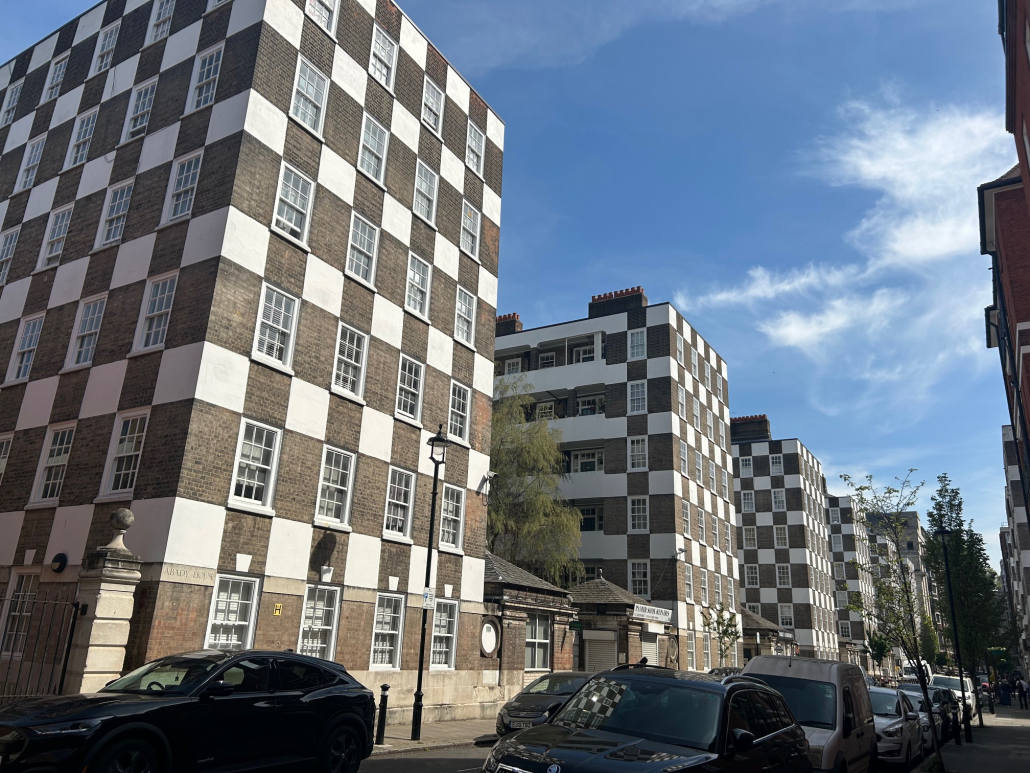The work of Sir Edwin Lutyens and his contemporaries 1920-40: Architecture – a three-dimensioned art
Day Conference, Saturday 1 November, 9.00am to 7.00pm
Speakers Dinner, 1 November, 7.30pm-10.30pm
Interwar Oxford Walking Tour, 2 November, 10.30am-1pm
Day conference in the Catholic Chaplaincy, The Old Palace, Rose Place, St Aldate, Oxford OX1 1RD and Campion Hall
Speakers Dinner, Old Dining Hall, St Edmund Hall, Queen’s Lane, Oxford OX1 4AR
Interwar Oxford Walking Tour, starting point Blackfriars Priory, St Giles, Oxford OX1 3LY
Day Conference
Glossed over by many as notable only for marking the transition to Modernism, the restless and transitional years between the World Wars have too often been misrepresented. This study day seeks to show their rich reality and to correct this glib dismissal. It will touch on the many overlapping themes and contextual cross-currents at play over two decades of remarkable contrasts for architecture with Sir Edwin’s work always the point of reference. The conference title derives from a comment in Lutyens’s 1929 review of Le Corbusier’s Towards a New Architecture, in which he challenged Corb’s focus on two-dimensional lines and diagrams.
A session visiting the neighbouring Campion Hall, designed by Lutyens in 1936, will provide first-hand evidence of the great architect’s exceptional contribution to this period. The Hall’s elegant constraint fuses old and new. Now serving the needs of an academic institution and a working college, access is a rare privilege, and we are grateful to Peter Davidson and the Jesuits for enabling.
The subjects the many experts have chosen to share give a taster of the breadth of design in this period of contradictions and, through patron, critic and architect, will unpack the diversity of thinking, compositions that were – and were not- responsive to the changing times. Into what forms did the continuity with the late Victorian and Edwardian years develop, taking in the neo-Georgian and Arts and Crafts. Who responded to the ‘irruptive tendencies’ surfacing before 1914 and what were the innovations, experiments and new inspirations? Was there a future for traditional building methods. Did modernity have a place in traditional compositions? Your part in this exploration will be invaluable, please join us.
The programme (final titles to follow) includes the following enticing papers:
- Rosemary Hill, Gavin Stamp and Interwar British Architecture
- Charles Hind, Lutyens’s Office in the interwar years
- Robin Prater & Deborah Mays Lutyens’ s Page Street, Westminster Housing Scheme
- Alan Powers, Goodhart Rendel
- Elizabeth McKellar, Sir John Summerson
- Posy Metz, Celebrating the architecture of Interwar England
- David Lewis, Sir Giles Gilbert Scott
- Geoffrey Tyack, Sir Herbert Baker
- Julian Holder, Vincent Harris
- Jane Stevenson, Sir Clough Williams-Ellis
- Robert Proctor, Sir Percy Thomas
- Sarah Crellin, Sir Charles Wheeler
Steven Parissien, Peter Davidson and Jake Bransgrove will adeptly facilitate the sessions and the discussions.
The study day will include tea/ coffee on arrival and mid-morning, a buffet lunch, a glorious cream tea in Campion Hall and end with a glass or two of prosecco.
Speakers Dinner
To continue discussion and thank speakers, contributors and sponsors, we are providing an evening dinner. A three-course banquet, wine, expert company and all in the seventeenth century, Gothic surroundings of St Edmund Hall’s Old Dining Hall. A welcome opportunity to conclude a memorable day.
Interwar Oxford Walking Tour
For those staying around or those available on the morning of Sunday 2 November, we are offering a walking tour of key interwar masterpieces in Oxford. Starting in E Doran Webb’s Blackfriars Priory (1921-29), St Giles at 10.30am with coffee and introduction, the tour will include several sites, not least, Sir Herbert Baker’s Rhodes House (1926-28) and last about 2 hours, concluding by 1pm. For those interested, we are kindly invited to join the mass in Blackfriars from 9.30am.
The conference’s interwar and contextual theme sits along side that of the CSCA conference ‘Sir Edwin Lutyens: ‘The High Game’, held in Cambridge, November 2024, which focused on Lutyens shift to classicism.
Our Sponsors
The conference would not have been possible without the generous joint sponsorship of Adam Architecture and C C Construction and we are immensely grateful to both for their support.
Getting There
Oxford is well-served by public transport but many Oxford streets are closed to traffic and parking is severely limited.
Trains: Direct services run from London Paddington (serving Oxford station) and London Marylebone (serving Oxford and Oxford Parkway stations). Other services operate from the north via Birmingham New Street; from the south via Reading; and from the west via Didcot or Reading.
For details and to plan your journey, see contact National Rail Enquiries.
Oxford Railway Station is a 5-10 minute walk from the centre of Oxford. Please use Google Maps or our interactive map to find your way from the station to the part of the University you are visiting.
Cars: Visitors are encouraged to use the five Park and Ride bus services. There are five Park and Ride sites which serve Oxford City Centre.
Please note that there is a zero emission zone in central Oxford and if you enter this you must make a payment.
Parking in Oxford city centre is limited and can be expensive. For information on car parks, on-street parking and costs of parking, see Oxfordshire County Council’s website.
Accommodation
The range of options for staying in Oxford is good but the conference is being held during term time and you are advised to book any accommodation early to avoid disappointment or undue expense.
Experience Oxford lists some good hotels. Booking.com and AirBnB offer a good range of hotels and apartments. University Rooms in the Halls of Oxford are also available for booking.
Please advise us of any special requirements.
Images
Portfolio image: Door to Campion Hall, credit Steve Cadman CC BY-SA 2.0 WikiCommons
Accompanying image: Page Street, Westminster Grosvenor Housing Scheme
Online bookings
Please make your booking online through PayPal using your credit / debit card or PayPal account.
Events Terms and Conditions
Events Disclaimer
Neither The Lutyens Trust nor the Leader or Organizer of any event or walk advertised in this Newsletter or any other programme organized by The Lutyens Trust shall be held liable for the death of or injury or damage to the person or property (including theft or loss) of any member of the Trust or any guest or any person occurring during or arising from participation in any of the events advertised in this Newsletter or programme. Members are reminded that they should have adequate personal and travel insurance cover.
Refund Policy
Refunds for cancellations requested after the 14-day cooling-off period are subject to a £25 administration charge.
Refunds will only be issued for cancellations made no later than 14 days prior to the event start date. It may be possible to make a member substitution if you contact us at least a week in advance of the event.
Transfers to another event cannot generally be made. Any such transfers that are agreed by the Lutyens Trust will be subject to a £25 administration charge.
If the Lutyens Trust cancels the events, we will refund the event fee in full.
If the Lutyens Trust postpones, reschedules or relocates that event, or makes any other material alterations which mean you are no longer able to attend, we will refund the event fee in full.




